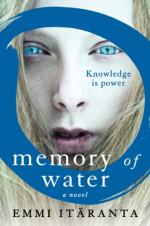|
This section contains 554 words (approx. 2 pages at 400 words per page) |

|
Memory of Water Summary & Study Guide Description
Memory of Water Summary & Study Guide includes comprehensive information and analysis to help you understand the book. This study guide contains the following sections:
This detailed literature summary also contains Quotes and a Free Quiz on Memory of Water by Emmi Itaranta.
The following version of this book was used to create the guide: Itäranta, Emmi. Memory of Water. Harper Voyager, 2014.
Emmi Itäranta's novel Memory of Water is written from the main character Noria's first person point of view. The novel is set in a future Scandinavian Union recently overtaken by the New Qian regime. The narrative straddles multiple temporal settings, and thus employs both the past and present tenses. The following summary embraces a streamlined mode of explanation and relies upon the present tense.
Seventeen-year-old Noria has been apprenticing under her father Mikoa for many years. He is the village tea master, and Noria hopes to assume his role after receiving her certification. Because women do not normally act as tea masters, Noria's mother Lian urges Noria to consider pursuing other studies in the city.
To Noria, there is little more important than tea and water. In her reality, water is a resource controlled by the New Qian government. Although all of the citizens' water is rationed, Noria and her family have access to a secret spring in a nearby cave. They keep the spring a secret, as they need its water for tea ceremonies. Furthermore, revealing its existence and location would threaten their safety.
One day, a group of soldiers visits Noria's home, convinced the family has a secret well on the property. Once they finally leave, Noria hopes things will return to normal. However, the opposite quickly proves true. Lian tells Noria that she has accepted a research position at the University of Xingjing and will be leaving the village. She invites Noria to come with her. Although she will miss her mother, Noria decides to stay in the village with her father.
Not long after Noria's mother departs, her father falls ill. Shortly after he collapses one night, Mikoa dies. In the wake of both her parents' absences, Noria struggles to reorient to her increasingly unfamiliar reality. She becomes more and more reliant upon her relationship with her childhood best friend Sanja.
Together, Noria and Sanja discover a series of mysterious recordings from a former era, the Twilight Century. The recordings teach them about an expedition to the Lost Lands, a region deemed contaminated by the government. The more they study this era and expedition, the more curious the friends become about leaving the village in search of new water sources. Over time, they develop a plan to venture out into the unknown together. However, on the night of their departure, Sanja is forced into hiding and Noria is taken captive by soldiers in her own home. The soldiers have imprisoned Noria after learning about the secret spring. Indeed, not long after Noria showed Sanja the spring, the entire village learned of its existence. Noria is unsure if someone betrayed her. She does not, however, have any interest in revealing the spring’s location to the military to exact her freedom.
Over the course of the following weeks and months, Noria struggles to survive in captivity. She has no contact with the outside world. She has little food and water. Suddenly her death feels imminent. She realizes that when she dies, her story will disappear. In order to preserve and control her narrative, she uses the last blank pages in her notebook to record her account.
Read more from the Study Guide
|
This section contains 554 words (approx. 2 pages at 400 words per page) |

|



